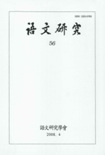- 영문명
- A Study on the Ways to Make Revision and Feedback the Motives of Writing
- 발행기관
- 어문연구학회
- 저자명
- 구자황(Ja-hwang Gu)
- 간행물 정보
- 『어문연구』語文硏究 第56輯, 323~343쪽, 전체 21쪽
- 주제분류
- 어문학 > 한국어와문학
- 파일형태
- 발행일자
- 2008.04.30

국문 초록
영문 초록
Revision and feedback create a place to meet with the writings of the learners and communicate with their inner worlds. Revision doesn"t just refer to revising a draft by rearranging phrases, correcting a mistake. or improving the vocabulary choices. It"s a very "creative job" that should be connected to feedback on its extension. Thus it"s critical to approach revision and feedback from the perspective of developing thinking abilities to organize meanings and to implement them throughout the entire process of thinking. Communicating with the text and the reality beyond the text, they should be able to completely reflect and create the "creative force" of writing.
From the perspective that writing was the best way in writing education and that revision and feedback were the essential methods to decide the writing quality even though they didn"t guarantee the best result, this study focused on the effective teaching and learning strategies with regard to revision and feedback. It pointed out that the essence of revision and feedback was not quantity but quality and that it"s necessary for revision and feedback to have a minimal "manual" considering strategies, principles, and tools. It"s also noted that revision and feedback were not overall, one-sided delivery of knowledge but "conversational interactions."
There are two ways to more activate revision and feedback and to materialize them as the motives of writing education ; the first one is to develop tools to vitalize revision and feedback and expand and reinforce programs to connect them with classes. And the other one is to set up a devoted agency of independent status to the overall aspects of writing education and study in connection to actual classes and establish a regular system for revision and feedback under the supervision of the agency.
From the perspective that writing was the best way in writing education and that revision and feedback were the essential methods to decide the writing quality even though they didn"t guarantee the best result, this study focused on the effective teaching and learning strategies with regard to revision and feedback. It pointed out that the essence of revision and feedback was not quantity but quality and that it"s necessary for revision and feedback to have a minimal "manual" considering strategies, principles, and tools. It"s also noted that revision and feedback were not overall, one-sided delivery of knowledge but "conversational interactions."
There are two ways to more activate revision and feedback and to materialize them as the motives of writing education ; the first one is to develop tools to vitalize revision and feedback and expand and reinforce programs to connect them with classes. And the other one is to set up a devoted agency of independent status to the overall aspects of writing education and study in connection to actual classes and establish a regular system for revision and feedback under the supervision of the agency.
목차
1. 들어가는 말 : 대학 글쓰기의 구체성 요구
2. 현실적 의미맥락 안에서의 용어 혹은 개념
3. 기존 논의의 지평과 윤곽
4. 활동 중심의 수정과 통합적 피드백
5. 나오는 말 : 이론적ㆍ현실적 지평을 위하여
참고문헌
Abstract
2. 현실적 의미맥락 안에서의 용어 혹은 개념
3. 기존 논의의 지평과 윤곽
4. 활동 중심의 수정과 통합적 피드백
5. 나오는 말 : 이론적ㆍ현실적 지평을 위하여
참고문헌
Abstract
해당간행물 수록 논문
참고문헌
최근 이용한 논문
교보eBook 첫 방문을 환영 합니다!

신규가입 혜택 지급이 완료 되었습니다.
바로 사용 가능한 교보e캐시 1,000원 (유효기간 7일)
지금 바로 교보eBook의 다양한 콘텐츠를 이용해 보세요!


